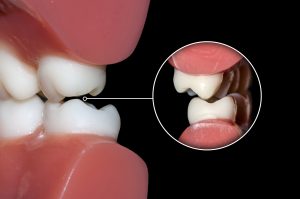 Everyone deals with bad breath at some point in their lives. Many people experience morning breath, while some people experience chronic bad breath that doesn’t go away easily. While bad breath can be bothersome just on its own, not being able to get rid of it can make the situation much more stressful. Usually, dealing with chronic bad breath may be a possibility with help from your dentist. If you have chronic bad breath, knowing the causes, both obvious and less obvious, can be helpful in solving the problem. (more…)
Everyone deals with bad breath at some point in their lives. Many people experience morning breath, while some people experience chronic bad breath that doesn’t go away easily. While bad breath can be bothersome just on its own, not being able to get rid of it can make the situation much more stressful. Usually, dealing with chronic bad breath may be a possibility with help from your dentist. If you have chronic bad breath, knowing the causes, both obvious and less obvious, can be helpful in solving the problem. (more…)
Am I Too Old To Straighten My Smile?
 Many adults with a crooked smile find themselves asking, “am I too old to straighten my smile?.” Movies and television have filled our heads with the images of teenagers wearing braces and headgear, which makes many of us mistakenly believe that straightening our smiles is strictly for adolescents. While Invisalign treatment is appropriate for kids and teens, it is also appropriate for adults. Misaligned smiles and crooked teeth can be problematic for anyone of any age. (more…)
Many adults with a crooked smile find themselves asking, “am I too old to straighten my smile?.” Movies and television have filled our heads with the images of teenagers wearing braces and headgear, which makes many of us mistakenly believe that straightening our smiles is strictly for adolescents. While Invisalign treatment is appropriate for kids and teens, it is also appropriate for adults. Misaligned smiles and crooked teeth can be problematic for anyone of any age. (more…)
Should I Replace My Tooth With An Implant?
 Losing even just one tooth can affect the way you look, eat, and even the way that you speak. A missing tooth can also leave your remaining teeth vulnerable to movement or loss. Tooth loss can lead to a loss of bone density in your jaw, which can have a negative affect on your smile’s health. Replacing a tooth with a prosthetic pontic like a crown, dentures, or bridge can improve your appearance and abilities. Replacing a tooth’s roots with a dental implant can prevent problems with your oral health.
Losing even just one tooth can affect the way you look, eat, and even the way that you speak. A missing tooth can also leave your remaining teeth vulnerable to movement or loss. Tooth loss can lead to a loss of bone density in your jaw, which can have a negative affect on your smile’s health. Replacing a tooth with a prosthetic pontic like a crown, dentures, or bridge can improve your appearance and abilities. Replacing a tooth’s roots with a dental implant can prevent problems with your oral health.
Health Problems Caused By Tooth Loss
Some people consider replacing a lost tooth as merely a cosmetic issue. It is important to remember that replacing a tooth is also important for your oral health. Depending on where your tooth loss has occurred in your smile, the way you bite and chew your food may be impacted. Having a lost tooth can put increased wear on your remaining teeth on the other side of your mouth because you may start chewing on the opposite side. The bone of your jaw is stimulated by the roots of your teeth. When your roots are removed with the tooth, you may experience bone resorption or a loss of density in your bone. Losing bone density can weaken the jaw and endanger your remaining teeth. The lack of bone density can cause the jawbone to shift or change shape, which can even cause replacement teeth to have a shaky foundation.
What To Expect
A dental implant is a bio-compatible titanium post that is inserted directly and precisely into your jaw bone. The post will serve as an anchor for a replacement tooth pontic. The dental implant provides stimulation to the jawbone, which will help prevent the body from taking away essential minerals and causing bone density loss. The implant can also absorb pressure from biting and chewing, which can even out the wear and tear of your teeth.
Do you have a missing tooth?
Ask Dr. Coon if an implant is right for your smile. To schedule a consultation, call Grinnell Street Dental at (307) 672-7567. Located in Sheridan, WY, we also proudly serve the residents of Gillette, Billings, Miles City, and all surrounding communities.
Is Carbonated Water Okay For My Smile?
 Carbonated water known as sparkling water, especially flavored sparkling water, is very popular right now. The drink has become a healthy choice for those that want to get the bubbles of soda without the additional sugar. However, it has come into question of whether or not carbonation is healthy for your smile. There have been concerns that any carbonation, including sparkling water, has a higher level of acidity. Acidity can lead to attacks on the outer layer of your teeth known as enamel, which can weaken your teeth. The important question to ask: does carbonated water have enough acidity to negatively affect your smile? According to the research currently available, sparkling water is not harmful for your teeth. (more…)
Carbonated water known as sparkling water, especially flavored sparkling water, is very popular right now. The drink has become a healthy choice for those that want to get the bubbles of soda without the additional sugar. However, it has come into question of whether or not carbonation is healthy for your smile. There have been concerns that any carbonation, including sparkling water, has a higher level of acidity. Acidity can lead to attacks on the outer layer of your teeth known as enamel, which can weaken your teeth. The important question to ask: does carbonated water have enough acidity to negatively affect your smile? According to the research currently available, sparkling water is not harmful for your teeth. (more…)
Damage Caused By Grinding Teeth
 Grinding your teeth, which is known as bruxism, is a common problem for many people. It often happens while you are sleeping. If it happens while you are asleep, how do you know if you if you suffer from it? Do you wake up with a sore jaw, sore cheeks, or sore teeth? Do you wake up tired after a full night of sleep? Do you frequently wake up with a headache? Do you have teeth that are sensitive to cold, hot, or sweet foods? If you answered yes to any of these, it could be signs that you are grinding your teeth while you sleep. Did you know that grinding your teeth could cause damage to your teeth, mouth, and even jaw? (more…)
Grinding your teeth, which is known as bruxism, is a common problem for many people. It often happens while you are sleeping. If it happens while you are asleep, how do you know if you if you suffer from it? Do you wake up with a sore jaw, sore cheeks, or sore teeth? Do you wake up tired after a full night of sleep? Do you frequently wake up with a headache? Do you have teeth that are sensitive to cold, hot, or sweet foods? If you answered yes to any of these, it could be signs that you are grinding your teeth while you sleep. Did you know that grinding your teeth could cause damage to your teeth, mouth, and even jaw? (more…)
Is Full-Mouth Rehabilitation Right For Me?
 Throughout your life as you age, your mouth and smile can take on quite a bit of wear and damage. Whether from decay, injury, accidents, just aging or wear, your smile may look differently than it used to. A full-mouth rehabilitation is a comprehensive and conservative overhaul of your smile. A full-mouth rehabilitation addresses both health concerns and cosmetic issues. To upgrade your smile, you and your dentist will first need to decide what your mouth needs, what your smile goals are, and how you want to get there. A full-mouth rehabilitation may likely include several different treatments spread across multiple consultations and appointments with your dentist. (more…)
Throughout your life as you age, your mouth and smile can take on quite a bit of wear and damage. Whether from decay, injury, accidents, just aging or wear, your smile may look differently than it used to. A full-mouth rehabilitation is a comprehensive and conservative overhaul of your smile. A full-mouth rehabilitation addresses both health concerns and cosmetic issues. To upgrade your smile, you and your dentist will first need to decide what your mouth needs, what your smile goals are, and how you want to get there. A full-mouth rehabilitation may likely include several different treatments spread across multiple consultations and appointments with your dentist. (more…)
How Does A Filling Save My Tooth?
 Despite how well you keep your on top of your oral hygiene, tooth decay can happen. Unfortunately, cavities can strike even the mouths of those who are vigilant about their oral health. Decay can be caused by tooth grinding, genetics, and other reasons beyond a lax in oral hygiene. Whatever the cause of the cavity, it is important to take care of it as quickly as possible. If you are keeping up with your recommended dental exams at least twice a year, your dentist can better identify a cavity in time to treat it with a filling. A filling can save your tooth from further harm or even extraction. (more…)
Despite how well you keep your on top of your oral hygiene, tooth decay can happen. Unfortunately, cavities can strike even the mouths of those who are vigilant about their oral health. Decay can be caused by tooth grinding, genetics, and other reasons beyond a lax in oral hygiene. Whatever the cause of the cavity, it is important to take care of it as quickly as possible. If you are keeping up with your recommended dental exams at least twice a year, your dentist can better identify a cavity in time to treat it with a filling. A filling can save your tooth from further harm or even extraction. (more…)
Do You Want A Whiter Smile In 2018?
 The new year may mean you want to make big changes in your life. Some people use the motivation of New Year’s resolutions to kick off a new lifestyle or to try things they have never tried. Do you want to refresh your life a bit in 2018? Whitening your teeth can be a fast and simple way to make a big difference in your appearance. Even if you are a person who does not make resolutions, you may find yourself finally wanting to get that bright, white smile that you have always dreamed of. (more…)
The new year may mean you want to make big changes in your life. Some people use the motivation of New Year’s resolutions to kick off a new lifestyle or to try things they have never tried. Do you want to refresh your life a bit in 2018? Whitening your teeth can be a fast and simple way to make a big difference in your appearance. Even if you are a person who does not make resolutions, you may find yourself finally wanting to get that bright, white smile that you have always dreamed of. (more…)
Smile Benefits From Porcelain Veneers
 A flaw in your smile is only a flaw when: it makes you feel insecure or it causes problems for your health. If your smile has unique characteristics that you feel confident about and your smile is healthy, it has no flaws. However, if you have any cosmetic issues in your smile that make you feel self-conscious about smiling, talking, or laughing, you may have smile flaws. Porcelain veneers can be a great way to address issues about your smile that may make you feel self-conscious. Prior to contrary belief, veneers do not have to look like a cookie-cutter version of everyone else’s smile. Veneers can provide a customized upgrade to your own teeth. (more…)
A flaw in your smile is only a flaw when: it makes you feel insecure or it causes problems for your health. If your smile has unique characteristics that you feel confident about and your smile is healthy, it has no flaws. However, if you have any cosmetic issues in your smile that make you feel self-conscious about smiling, talking, or laughing, you may have smile flaws. Porcelain veneers can be a great way to address issues about your smile that may make you feel self-conscious. Prior to contrary belief, veneers do not have to look like a cookie-cutter version of everyone else’s smile. Veneers can provide a customized upgrade to your own teeth. (more…)
When Can Cosmetic Bonding Help My Smile?
 Minor flaws in your smile are not flaws if they do not bother you and they do not cause problems with your health. However, if you find yourself fixated on a minor issue in your smile, it is a flaw. Minor cosmetic flaws in your smile can be fixed with cosmetic bonding. Cosmetic dental bonding is a minimally invasive cosmetic procedure that can address issues like chips, cracks, stains, unevenness, and more. When do you know when bonding is the best cosmetic option? (more…)
Minor flaws in your smile are not flaws if they do not bother you and they do not cause problems with your health. However, if you find yourself fixated on a minor issue in your smile, it is a flaw. Minor cosmetic flaws in your smile can be fixed with cosmetic bonding. Cosmetic dental bonding is a minimally invasive cosmetic procedure that can address issues like chips, cracks, stains, unevenness, and more. When do you know when bonding is the best cosmetic option? (more…)







